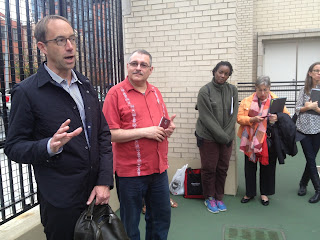December 1, 2024
Under every NYC Mayor, highly problematic and even corrupt DOE contracts have been awarded since mayoral control was instituted in 2002. Just a few of the most egregious examples:
- During the Bloomberg years, a consultant named Ross Lanham stole more than $3 million from DOE in 2002 to 2008, and allowed Verizon and IBM to overcharge for school internet wiring as well. The FCC excluded the DOE from more than $100 million of federal E-rate reimbursement funds for many years as a result.
- Also under Bloomberg, between 2007 and 2011, Judith Hederman, a high level
DOE official, fixed contracts with a firm called Future Technology Associates, colluding in a successful plot to steal $6.5 million dollars.
- Under Mayor De Blasio in 2015, DOE
proposed a $1.1 billion contract for a firm called Custom Computer
Specialists, again for internet wiring, renewable to $2 billion over
nine years, despite the firm's involvement in the
Lanham scandal just a few years before. After the news broke, the
contract was hurriedly renegotiated overnight, with the cost cut in half to $627 million,
with no other change in terms, suggesting how inflated it was in the first
place. The Panel for Educational Policy rubber stamped the contract anyway, 10-1. But because investigative reporter Juan
Gonzalez continued to write about it, City Hall eventually cancelled the contract and forced DOE to rebid it, at a savings of between $163 and $727 million.
- In 2021, Eric Goldstein, head of DOE School Support Services, renewed a million dollar contract for chicken nuggets in return for a bribe, even though the product had been found to contain bone and metal fragments and posed a serious choking hazard to students.
- In 2023, Chancellor Banks agreed to a contract with a company called 21stCentEd after it had hired his brother as a lobbyist, triggering payments of more than $1.4 million.
Clearly, the process needs far more transparency and oversight by the Panel for Educational Policy which has the responsibility to approve contracts. And yet this administration has slid backwards in terms of transparency.
As a result of the scandal generated by the inflated Custom Computer Specialists contract, which was posted only a few days before the
PEP vote, the DOE agreed from then on to post all proposed contracts at least 30
days prior to allow for more public scrutiny. See the articles about
this promise in the Daily News and Gotham Gazette at the time. However, this administration does not adhere to this promise. For example, the list of contracts to be voted on during the December 18, 2024 PEP meeting is still not posted-- only 17 days away.
The ability of PEP to perform oversight has also been severely hampered by the fact that its members are denied the right to see the actual contracts before their vote. The excuse given by DOE to members is that the actual contracts are not written until after they are approved --a highly problematic way to do business. And yet it has not always been done this way..
During the Bloomberg years, Patrick Sullivan, the Manhattan Borough Appointee to the PEP was allowed to examine proposed contracts before the Panel vote, as he recounts in a recent memo to PEP Chair Greg Faulkner and other current PEP members. Patrick was granted this opportunity after then-chair of the Assembly Education Committee Cathy Nolan and Assemblymember Daniel O'Donnell wrote a letter to Chancellor Klein, stating, "We are concerned that providing only a summary of contract materials to the PEP does not allow the body to fulfill its responsibility and urge you to reexamine this policy." Patrick's memo to the PEP is below.
Oct. 31, 2024
As the New York state law defining mayoral control was approaching sunset in 2009, I joined advocates to ask the legislature to strengthen oversight provisions. I testified before Assembly and Senate panels asking for the PEP to have a greater role in approving contracts and changes in school utilization. I joined the president of CEC1 and advocates to make this case directly to then Assembly Sheldon Silver.
As a result of these efforts, contract approval by the PEP was greatly expanded in the 2009 law. The requirement that any contract greater than a million dollars be approved put most material contracts under our purview.
The DOE resisted complying with the law. They refused access to the contracts we were to approve and directed us to summaries they prepared. I asked Assembly member Danny O’Donnell to intervene. He was the only Manhattan member on the Assembly Education Committee and my contact for legislative matters for the public schools.
The next day, he and Assembly Education Chair Cathy Nolan sent a letter to Chancellor Klein
him of the DOE’s obligations under the law, urging him to allow PEP members to be able to read
the actual contracts before the vote.
After that full copies of contracts were made available for my review in person at Tweed. I customarily reviewed those of interest the day before the Contracts Committee met. I also requested and received RFPs (requests for proposals) where I found areas of concern in contracts.
This review was invaluable to my oversight role. In one case, for example, my inquiries based on
my review triggered communications between fraudulent actors within DOE and a large vendor. This inquiry and the subsequent communications were cited in the SCI investigation in support
of their findings of fraud. In another case, a contract was rescinded by full vote of the PEP at my
request.
I strongly believe that only with the opportunity to access to the actual contracts, can PEP members responsibly fulfill their oversight responsibilities. Feel free to contact me if you have any questions.
Patrick Sullivan


















